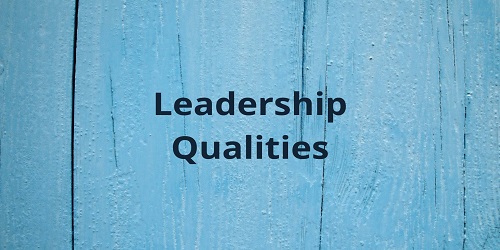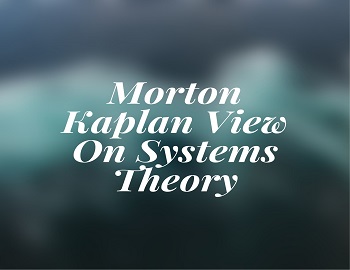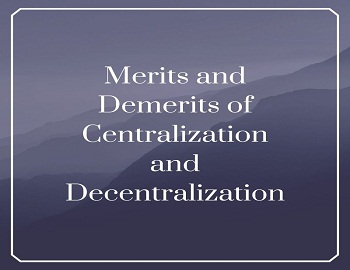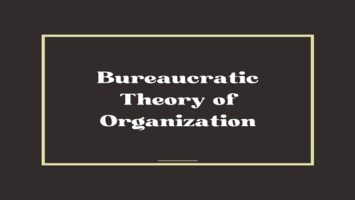Leadership Qualities:
There are several qualities that are universally regarded as essential for Leadership. Only the presence of these qualities in the leader can make the leadership successful and effective. A good leader has to be a man of intelligence, ability, hard work, understanding, and personality.
While discussing the qualities of an effective and successful leader, Appleby writes, “A good leader is anxious to take up responsibilities, and demonstrates continuing personal growth. Similarly, he is disposed well towards action, he is a good listener, who asks pointed questions and at the same time, he is willing to work with all sorts of people. He uses institutional resources and cares for power only as it contributes to effectiveness. He possesses self-confidence and is ready to admit his mistakes or limitations, is hospitable to bad news as well as good. In a similar manner, he respects subordinates as much as superiors and constantly strives hard to improve the institutional performance, and within a democratic setup, he respects political processes and responsibilities.”
According to Millet, the following are the qualities of a successful and effective leader:
(1) Good health, personal energy, and physical endurance.
(2) A sense of mission and personal commitment to a cause or purpose, enthusiasm, and self-confidence.
(3) Persuasiveness, i.e., the capacity to win others.
(4) Judgement, the capacity to know the strength and weaknesses of the people who work with him as well as the ability to know how to obtain their maximum usefulness for the organization.
(5) Loyalty, devotion to a cause and also to the person with whom one works, and a willingness to defend the group against external attack.
(6) Interest in other people, sense of friendliness, and concern for others.
(7) Integrity, a sense of moral duty and fairness, willingness to share achievement, and capacity to set standards of personal and official conduct which will command the respect of others.
(8) Intelligence, i.e., readiness or quickness to comprehend the essential elements of necessary information and capacity to use knowledge.
Chester Barnard identifies four qualities of leadership. These are:
(1) Vitality and Endurance.
(2) Decisiveness.
(3) Persuasiveness.
(4) Responsibility and Intellectual Capacity.
The following can be described as the major qualities of a successful and effective leader:
(1) Good Health and Vitality- Possession of a generous and unusual endowment of physical and mental energy is the secret of the most successful leader. Good health and strength are essential assets for the effectiveness of a leader. Sluggishness, apathy, and fatigue are generally considered to be the stumbling elements for good leadership.
(2) A strong sense of Purpose and Direction- A sound sense of purpose and a clear direction constitute the second quality of good leadership. A good leader must have a strong sense of purpose and direction. He must be clear in the objective, purposes, and aims he wants to achieve. His priorities should be definite. He should be a man of conviction without, however, being rigid and diehard in approach. He should have the courage of conviction.
(3) A leader should be an Enthusiast- The mere presence of a sound purpose is not enough for a good leader. It must be supported by dynamic emotions, hope, and a sense of will to work. Enthusiasm requires great energy and deep intellectual response. He should himself feel encouraged in doing his work and at the same time, he should be in a position to encourage others. A good leader possesses all these qualities.
(4) Affection and Friendliness-Affection and friendliness are essential for a good leader. These are the positive motivating forces for regulating the conduct of those upon whom these are expressed. The tendency of friendliness and affection evokes a reciprocal response. A leader should be aware of the importance of public relations. He should have the knack for balancing a particular degree of formalism with informalism in his behavior.
(5) Maturity of Mind- The leader should keep broad interests and activities in mind. Experience is the best teacher. A leader has to get exposed to a wide variety of things and actions. To be more specific, a leader should be emotionally mature and possess a balanced temperament. Maturity of mind always comes from learning and a leader should always be prepared to learn the techniques of effective leadership.
(6) Adaptability- A good leader should always be ready to absorb and adopt new ideas and the views of others as may be demanded by the situation. If he lacks this quality, there may be organizational chaos. Therefore, for his own survival and for the survival of the organization, he has to be both open and adaptive, dynamic and flexible but not given to hasty decisions and impulsiveness. He should always be prepared to accept new ideas and methods but without compromising the basic structure of the policies and values of the organization he leads.
(7) Good Public Relations Man- The followers must be able to trust their leader. The leader should be a good public relations man. As a good public relations man, his aim should be not only to inform the public but also to know what the public wants. He must have the knack of feeling the pulse of his followers as well as initiating desired changes through corrective policies, plans, programmes, speeches, and conferences. His personality should be pleasing. A judicious use of mass media should be made by him for securing good public relations as well as for creating a good public image. The ability to use the media as a means of projecting his image as a leader is an essential quality in this age of information and communication.
(8) Man of Integrity- The followers want to feel a sense of solidarity, honesty, and reliability towards the leader. In short, they want the leader to possess integrity. Where there is a divergence of views relating to the major objectives of the organization, the integrity of the leader is needed for arriving at a consensus or shared decision-making. In a complex pluralist society, there are always present several competing, as well as conflicting demands, and decision-making is always a problematic exercise. In this situation, people expect the leader to possess complete integrity. He should be in a position to project his decision as fair and the best possible under a given situation. His integrity as a leader should be above the board. The behavior of the leader should be such as can earn the faith of the people in his integrity and devotion to work.
A leader has to combine all these qualities for making his leadership effective and successful. The degree to which these qualities are present determines the degree of effectiveness of the leadership.









Comments (No)